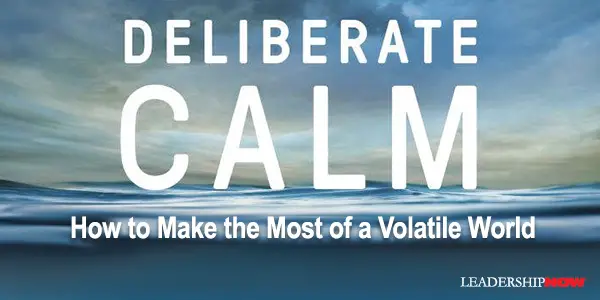 |
 |
01.13.23

Deliberate Calm: How to Make the Most of a Volatile World
CHAOS and uncertainty are a part of life. Are you making the most of it? To make the most of a turbulent world we need to be able to balance our emotions with a rational and deliberate thought process in real time that allow us to learn and thoughtfully and creatively move through the circumstance or what authors Jacqueline Brassey, Aaron De Smet, and Michael Kruyt, call Deliberate Calm. Here’s the problem. At the very moment, we need to thoughtfully address the situation and select the behavior best suited for it, we instinctively do the opposite. In Deliberate Calm: How to Learn and Lead in a Volatile World, the authors refer to this as the Adaptability Paradox: “ At the very moment when we need to break free from our habitual patterns and creatively engage with the unfamiliar, complex, or uncertain situation and choose a new and innovative response, it is the very unfamiliarity, complexity, and lack of certainty that render us unable to do so.” Deliberate calm is about adaptability and self-mastery. It is about awareness, learning agility, and emotional self-regulation. Beneath the surface of our behavior is our core identity, made up of thoughts, feelings, and beliefs that we have developed and refined since childhood. Negative self-talk only reinforces this. Together they form the foundation of the mindset that sets in motion our behavior. Mostly this seems to work for us. It seems to protect us and our core identity. But in volatile situations, our ingrained reactions cause us to miss opportunities to learn and grow in more productive ways. The ability to detach ourselves from our thoughts and feelings is the first step forward. We need to develop Dual Awareness. Dual Awareness is having an “awareness of both our external and internal environments and how they impact each other.” Being able to do this means “we can recognize that our intense feelings are actually gifts. They are messages telling us that our typical behaviors may not be the best fit for the situation we are facing.” Dual Awareness has three layers: awareness of the situation and what it calls for, awareness of what is going on for you in the moment, and then responding effectively as a result. This helps us to recognize when we have entered an Adaptive Zone. In this zone, “we are facing challenges that require us to do something new that isn’t easy or natural for us to do, and if we fail, there are real consequences. The circumstances have outgrown our existing capabilities, and our normal habits, patterns, and behaviors no longer work for us the way we need or want them to.” When faced with an Adaptive Zone, it is time to shift into learning mode. Our default mindset can create blind spots. In those moments, however, we can accept and acknowledge our limited view, learn from the experience of others, and try to see things through their lens, we will expand our view of the world and solve far more complex problems than we ever could on our own. The question then becomes, “What would I need to believe in order to respond differently?” When we find ourselves in an Adaptive Zone, it is common “for all of us to blame others for our problems when we are in protection and operating from our default mindset and behavior patterns. We believe that the way we are seeing things is objectively true, so we do not look inward and examine other possibilities or the ways in which our own point of view might be skewed. This leads us to blame others or circumstances outside ourselves for our problems instead of taking ownership and finding ways we can change to create a better outcome.” We easily cling to what we know and what has worked for us in the past in the face of uncertainty, even though it is not working because it is comfortable and gives a sense of control. Having an overriding purpose helps us to remember why we do what we do and helps move us out of the familiar and embrace the Adaptive circumstance we face and learn from it. When two different mindsets collide, we typically find conflict. But “when handled well, with an open mind instead of judgment, defensiveness, or blame, conflict can in fact, be a major catalyst for learning.” Without Dual Awareness, we run the risk of being triggered in a state of protection, judging and blaming others, and beginning to form negative opinions about them. Then we perceive what they say and do in light of those opinions. The path to practicing Deliberate Calm is to “consciously design your life so it is easier to remain grounded and present no matter what is going on around you.” The Deliberate Clam model rests on four pillars: awareness, purpose, relationships, and energy. The book’s appendix provides a way to access where you are and create daily practices that will help you develop your Deliberate Clam muscle.

Posted by Michael McKinney at 07:26 AM
|
BUILD YOUR KNOWLEDGE
 

How to Do Your Start-Up Right STRAIGHT TALK FOR START-UPS 
Grow Your Leadership Skills NEW AND UPCOMING LEADERSHIP BOOKS 
Leadership Minute BITE-SIZE CONCEPTS YOU CAN CHEW ON 
Classic Leadership Books BOOKS TO READ BEFORE YOU LEAD |